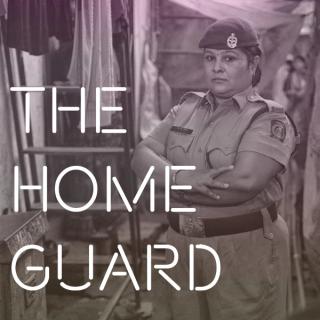
Episode 2: The Bar Dancer
Meet Rozy, the bar dancer who prefers this to a corporate office job.

For women, leaving home after dusk implies an automatic invitation to danger and societal censure. Some people have even justified sexual assault and rape on the premise that women out late at night should expect aggression.
Amidst this, four women — a cab driver, a bouncer at a popular club, a bar dancer, and a home guard constable guarding the women’s compartment in the local trains — have been defying societal constraints and patriarchal mindsets each night when they go to work. These four Mumbai women work through the night, breaking boundaries that society has traditionally set on women’s mobility, morality, and sexuality.
Here are their stories.
This episode follows Rozy, a dancer who knows she’ll earn more in a dance bar than in an office.
ROZY, THE BAR DANCER
Voice Over
(Proceedings from the Maharashtra State Legislature in the background)
Rozy: Society should not decide that. Women should know how to carry themselves.
And they know it. Just because a girl is wearing a short dress doesn’t mean she’s
doing something wrong. Society will not decide what women have to do.
Voice Over
Rozy: I could not pay my fees. Moreover, I had family issues. My mother was the
earning family member and would work as domestic help. But we couldn’t get the
amount of money we wanted. That’s why I had to come to this field. I wanted to do
Hotel Management, in fact.
Voice Over
Rozy: I was crying, I did not want to work there. It was a very new experience for me.
Guys were there, sitting and smoking. It was normal. They came for their enjoyment.
But it was quite weird for me. Initially, it was quite weird, but days passed, years
passed, I got used to it.
Kunal: What part of this was weird to you?
Rozy: Just guys smoking and drinking. Only that. Nothing bad was going on over
there. Nothing bad. Later on, I got used to this too.
Voice Over
Kunal: Did it feel like a very normal thing to do?
Rozy: It wasn’t so normal, but the bottom line was, we had to perform and earn
money. It was like a stage show, kind of. Many actresses, performers, do stage
shows and they get paid for it. I told myself that this wasn’t a bad thing. You are just
getting paid for your performance, that’s it.
Kunal: But how long did it take for you to digest this part?
Rozy: Say, almost 6-7 months to digest the fact that I had to do it.
Kunal: So, you kept feeling weird till then?
Rozy: Yes. Because, suddenly, like people do it, they perform… You know what our
job is? We don’t get the chance to learn the trade. We just have to dance on
whatever songs they tell us. This was a bit weird, initially. But now, we can do it. As
we girls get used to it, it gets easier. But I must add that this isn’t a bad thing at all;
the bar line is not a bad line to be in. It is not at all bad.
Voice Over
Kunal: Have you had such an experience, ever?
Rozy: I have had. There was a guy who was throwing money at me. I didn’t like this.
I told the manager that I did not like it, you please ask him to go. Maybe, later on,
he would do something wrong. I have had many such experiences.
Kunal: But he was just throwing money at you?
Rozy: That was just part of it.
Kunal: So, there was more to it?
Rozy: Ya, I mean, things happen. Many things happen. But, safety is always available
for us.
Voice Over
Ramesh, the customer: I was 35 and she was 18. Back then, I still felt good that I
could win a pretty girl’s affection, you know.
Voice Over
Solanki: I completely stopped going to work. Instead, I invested all my savings in a
small flat, so that I could stay with her.
Voice Over
Solanki: She was doing what was best for her. I should have done what was best for
me, you know.
Rozy: We are performing. If a guy is coming to the bar, we didn’t call him. They
came on their own. They came alone or with their friends. We didn’t tell them to
give us money. They can come here and just sit. It’s not a problem. We didn’t ask
them to spend money. It’s their wish and they will, if they want to. And they did. It’s
not that we ask them to do something. No. It all depends on them. If they want to
spend money they will, if they don’t want to, they won’t.
Voice Over
Rozy: I told them that I was working in this field. They were initially opposed to it;
they didn’t agree to it. They said it was not a good thing and even told me that I
would be working late at night. But later, I explained it and even showed them how
these bars work and showed them nothing ‘wrong’ was happening and it is
completely safe. That’s when they agreed to it.
Kunal: How important was it for you to have their approval?
Rozy: It was important because this was the income that was sustaining my
household. So, it was very important for them to understand me and where I am. It
was very important for me.
Voice Over
Rozy: We have fixed drivers, also. Depends. If we have fixed drivers, then it’s cool. If
not, they give us designated cars and autos, depending on where we live, and they
send us home. So, that’s how we travel.
Kunal: Did your family feel the apprehensions that I am feeling, about the safety of
the late-night commute?
Rozy: Sometimes when I don’t answer their calls, they get worried thinking it is too
late. So, it is my mistake that I am not answering their calls. Otherwise, no, they
don’t have such apprehensions. I have a fixed driver. So [my mother] can even
contact the driver and find out where I am.
Voice Over
Kunal: There is a perception that the women who work in bars are exploited, that
men harass them. That the woman, you, are helpless.
Rozy: No, nobody can touch us. We have guards outside. If you have been to a bar,
you must have seen that whenever someone tries to touch us, everyone comes and
prevents that. The customers might be drunk but the bar takes all precautions. We
have every safety measure available to us. They even ensure that we reach home
safe. Even inside the bar. They offer us all the safety precautions you can think of.
We draw the line and tell men to behave. If they are behaving in a wrong way or
trying to say or do something, we can actually tell them to leave from there. It’s not
like we are helpless in the bar. We are not.
Voice Over
Bharat Thakur: Look, there has never been an incident in our industry where a
dancer is going home and has been assaulted or molested or she has been
kidnapped while she is going back home late at night. But, we can offer many
examples of such instances happening in other sectors, where women have been
harassed or exploited.
Voice Over
Rozy: I must say, it is not at all a bad field. It is a good field and you’ll make a good
amount of money. There are so many women who have had financial issues;
thousands of such women have been able to solve their financial issues by coming
into this field. Many, many girls.
Voice Over
Rozy: Respect…I don’t know about the respect. But, they give us respect. We don’t
care about the world at all, of course, we don’t.
Voice Over
Kunal: Given us a choice, if let’s say you earn the same amount of money you earn
today in a day job, would you much rather do that than this?
Rozy: Yes, I would prefer working in the day. If there is safety, that is, and if I get the
same money, then yes. But, if there is no safety, then I would prefer working here.
Here, they take care of our safety, ensure we reach home safe.
Kunal: By safety, do you mean job security or physical safety?
Rozy: Job security, everything. Related to me, what time I leave from there, that I
should reach home safely. Here, they take care of our safety and ensure we get
home safe.
Voice Over
Rozy: Since I was a child, I was always very stubborn, but I was also very weak. If
someone came and told me something, I would not be able to respond. Not
anymore, though. I will not hear a word anymore. I will give it back.
Kunal: Has the ‘new’ Rozy ever created any problems for you?
Rozy: Never ever. Instead, it has only made my life better. Now, I can confidently
talk to people, like I am talking to you now. Earlier, I couldn’t.
Voice Over
Kunal: What do you have there, as a tattoo?
Rozy: It says, “Stay Strong!” (Laughs)
Kunal: When did you get that?
Rozy: Two years ago. It is all about staying strong! How strong you are and how you
deal with people.
Kunal: Is that a message that you have for yourself?
Rozy: Yes, that I must always stay strong. (Smiles)
This transcript has been lightly edited for clarity. The customer’s name has been
changed and his story has been dubbed by an artist to voice to conceal his identity.
Keep listening
Browse Series
